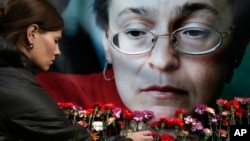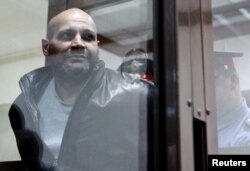A former Russian detective who was convicted over the 2006 murder of a Russian investigative journalist has been pardoned in exchange for fighting in Ukraine, his lawyer said.
Sergei Khadzhikurbanov was given a 20-year prison sentence in 2014 for his role in organizing the murder of Anna Politkovskaya, a well-known reporter at the since-banned independent Russian outlet Novaya Gazeta.
Khadzhikurbanov’s lawyer, Alexei Mikhalchik, told the Russian outlet RBC on Tuesday that Khadzhikurbanov had received a presidential pardon for the crime after finishing a six-month military contract in Ukraine. Khadzhikurbanov has remained in the armed forces in Ukraine, the lawyer said.
Politkovskaya was shot and killed outside her Moscow apartment in October 2006 in a slaying that at the time underscored rising threats facing journalists in Russia as the Kremlin cracked down harder on reporters and other critics.
Gulnoza Said, the Europe and Central Asia program coordinator at the Committee to Protect Journalists, or CPJ, condemned the pardon as an affront to press freedom.
"It’s a slap in the face of all journalists in Russia," Said told VOA. "Instead of trying to right the wrong and achieve justice in Politkovskaya’s case, [Russian President Vladimir] Putin pardoned one of the perpetrators."
Politkovskaya was best known for her coverage of abuses in Russia’s war in Chechnya in the early years of Putin’s presidency. Despite death threats and detentions, the journalist won over a dozen awards for her coverage.
"She often was the only person with whom local people could talk and share their grievances and feel heard," Said added.
In a joint statement with Novaya Gazeta, Politkovskaya’s two children Vera and Ilya said they were not notified about Khadzhikurbanov’s pardon.
"For us, this ‘pardon’ is not evidence of atonement and repentance of the killer. This is a monstrous fact of injustice ... Desecration of the memory of a person killed for her beliefs and professional duty," the statement said.
Mikhalchik, the lawyer, said Khadzhikurbanov last year took part in a deal offered by Russia’s defense ministry and the Wagner private military group in which Russian convicts are permitted to return to normal life, without serving the remainder of their sentence, if they survive six months of fighting in the ongoing war in Ukraine.
Khadzhikurbanov was one of five people jailed in 2014 over Politkovskaya’s murder, but investigators at the time did not identify the person who ordered the killing.
In 2018, the European Court of Human Rights determined that although authorities had convicted the group of men directly involved in the killing, they had "failed to take adequate investigatory steps to find the person or persons who had commissioned the murder."
Russia’s Washington embassy did not immediately reply to VOA’s email requesting comment.
Politkovskaya, who was 48 years old when she was killed, is among at least six Novaya Gazeta reporters and contributors who have been killed since 2000.
In the fall 2006 edition of the CPJ’s magazine Dangerous Assignments, the press freedom group named Politkovskaya as one of the world’s top press freedom figures of the past 25 years.
In an email interview with CPJ shortly before her killing, Politkovskaya said she was frustrated with the declining press freedom situation in Chechnya. She cited the deadly 2004 hostage crisis in the North Ossetian town of Beslan as an example.
"There is so much more to write about Beslan," she told CPJ, "but it gets more and more difficult when all the journalists who write are forced to leave."





